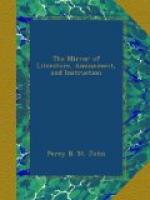Time sped, and upon an occasion when Lord Mortimer returned for a week or two to his Castle, the conduct of his chief huntsman was reported to him; but Charles with consummate art, so vindicated himself, and so contrived to disgrace his accusers, that when the young baron again left home, he stood higher perhaps than ever, in his confidence and favour.
It was the bright summer-time, the period when rural folks make holiday, (at least they did so then, but times have strangely altered of late in once merry England,) the woods put on their brightest green, and the people their finest clothes, for there were wakes, fairs, and rustic meetings innumerable in the vicinity of the Castle. Charles the huntsman might, as usual, be seen at these fetes for nothing, but after his late victory, he carried his head higher, assumed a swaggering gait, and looked his neighbours out of countenance with impudent defiance.
The village feasts were not yet over, when late one night, a cavalier, passing through one of the great forests which surrounded Mortimer Castle, beheld, (for it was a moon-light night,) a female form slowly sauntering about the bridle-way in which he was riding, and uttering heavy moans and sobs. At first, taking this figure for something supernatural, the traveller was startled, but quickly recovering himself, he rode boldly up to, and addressed, the object of his idle fears:—“I have been waiting here for hours,” replied the young woman, for such indeed she was, “and my friend is not yet come; I am sadly afraid, sir, some accident may have happened to him.”
“Him!” quoth the stranger laughing, “O my good girl, if you be waiting for a gentleman, no wonder you’re disappointed. He has played you false, rely upon it, and won’t come to night,—so you’d better go home.”
“O sir! O my Lord!—I cannot—I dare not! What would father and mother say? and what could I say?”
“Ay—Annette,—Annette Martin,—what could you say?”
“Only the truth, your lordship;” replied the poor girl sobbing, and curtseying, “and then they’d turn me out of doors, for they do so hate Charles,—Charles Elliott, your honour,—that they’ve as good as sworn, as they’ll never consent to my marrying him, and so—and so—I was just a waiting here to-night for him to come as he promised he would, and take me away to the far off town, and”—
“And there marry you, I suppose, without your father and mother’s consent:—eh, Annette?”
“Yes, my lord, an please you,” replied the poor girl with another rustic dip.
“No, Annette,” replied the young baron, “it does not quite please me; and Charles, at any rate, unless some very unforeseen circumstance should have detained him, shall know what I think of his present conduct to you. But come,—mount behind me,—I am unexpectedly returning to the Castle, Dame Trueby shall there make you comfortable for to-night, your parents and friends shall never know but that your absence from home was occasioned by a regular visit to her, and your marriage in two or three days, with my sanction, Annette, will, I think, completely settle matters.”




